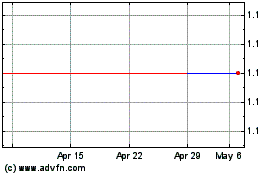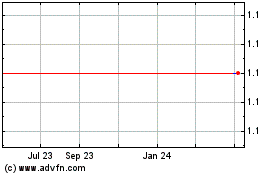By Emre Peker in Brussels and Georgi Kantchev in Moscow
Russia and Ukraine clinched a transit agreement for gas
deliveries to Europe, warding off massive disruptions in the new
year and securing steady supplies, even as U.S. sanctions
temporarily halted work on a new gas pipeline from Russia to
Germany.
Officials from Ukraine and Russia's state-run energy giant PAO
Gazprom unveiled details of their five-year contract on Saturday,
after crunch talks and last-minute compromises by Moscow and Kyiv
led to a protocol late Friday. The new contract, to take effect
Jan. 1, will replace a decade-old deal expiring Dec. 31.
The European Union, which relies on Russia as its top
natural-gas supplier, helped broker the deal to prevent a cutoff
that 10 years ago had crippled southeastern Europe midwinter.
Ukraine remains the primary artery for Russian gas exports to the
EU, despite Moscow's push for alternative routes that would
sideline Kyiv amid a five-year conflict.
President Trump, meanwhile, approved on Friday sanctions on the
Nord Stream 2 pipeline as it nears completion, potentially
bedeviling the Russian push to double its direct gas sales to
Germany, Europe's biggest buyer. The U.S. measure highlights
Western efforts to support Ukraine against Russian aggression and
stymie the Kremlin's attempts to isolate and economically hurt
Kyiv.
Following Mr. Trump's sanctions, Swiss pipe-laying firm Allseas
said Saturday it suspended all activity on Nord Stream 2. Gazprom's
wholly owned pipeline company, which is also based in Switzerland,
has repeatedly said it would complete the project, without
providing details.
The EU, which imports almost 80% of the gas it consumes, walked
a tightrope in more than a year of negotiations. Mr. Trump has been
pressuring European NATO allies to stop filling Moscow's coffers by
curbing their dependency on Russian gas, which accounts for some
40% of annual EU imports.
At stake for the EU was safeguarding critical energy supplies
that power European industries and homes, while maintaining
pressure on Moscow and backing Ukraine in peace talks.
"I welcome this well-balanced agreement," said Maros Sefcovic, a
top EU official who mediated the gas talks. "Russia remains a
reliable supplier to European markets and Ukraine maintains its
role as a strategic transit country. At the same time, Europe
proves its solidarity with Ukraine."
The agreement guarantees 65 billion cubic meters of Russian gas
deliveries via Ukraine next year, and 40 bcm annually from 2021
through 2024. Ukraine's Energy Minister Oleksiy Orzhel said at a
news briefing Saturday that the deal could be extended to 10 years,
which would help protect a steady revenue stream for Kyiv.
Russia and Ukraine's contract will also settle a long-running
legal battle between Gazprom and Kyiv-based Naftogaz over supply
and transit breaches. Under the accord, the Russian gas exporting
monopoly will pay the Ukrainian gas company almost $3 billion in
fines imposed by an international arbitration. In exchange,
Naftogaz will drop a recent $12 billion claim against Gazprom.
"As a result of complex and difficult negotiations, a package of
understanding has been reached," Mr. Orzhel said. "There will be
gas transit."
Gazprom's CEO Alexei Miller confirmed the details of the deal,
according to Russia's state-run TASS news agency.
The breakthrough followed efforts by France and Germany to
re-energize discussions toward a settlement to the Eastern Ukraine
conflict. Russian President Vladimir Putin and Ukraine's President
Volodymyr Zelensky agreed on steps to de-escalate tensions during a
summit in Paris earlier this month, following goodwill gestures
including a prisoner exchange in September.
North Atlantic Treaty Organization members have long been
concerned about the Kremlin's efforts to use energy as a political
weapon. The U.S. and Poland have led the charge in recent years,
particularly warning Germany against strengthening Moscow's hand by
increasing its dependency on Russian gas.
"We have no desire to exacerbate the situation in the energy
sector or use this to influence the situation in Ukraine itself,"
Mr. Putin said Thursday at his annual press conference, as
negotiators were reaching an agreement in principle in Berlin.
Still, Washington and many EU members wary of the Kremlin's
intentions have been fighting efforts to bypass Ukraine. That, some
observers say, would return Eastern Europe back into Moscow's
clutches. To prevent that, some EU members and the U.S. have been
trying to halt the construction of Nord Stream 2, the Baltic Sea
pipeline to Germany that would bypass eastern transit routes.
"Completing the project is essential for European supply
security," Nord Stream 2 spokesman Jens D. Mueller told the Journal
after construction was halted Saturday. "We together with the
companies supporting the project will work on finishing the
pipeline as soon as possible."
German Chancellor Angela Merkel said in parliament last week
that she would raise the sanctions with Mr. Trump, as the pipeline
was of strategic importance for Germany and Europe.
"The federal government rejects such extraterritorial sanctions
that affect German and European companies and interfere in our
internal affairs," a spokeswoman for Ms. Merkel said in a statement
issued in reaction to the stoppage of the work on the pipeline.
Even with Nord Stream 2, which could double Russian gas
deliveries to Germany to 110 bcm annually, Gazprom would need
additional capacity via Ukraine to maintain its record high exports
to Europe -- which topped 200 bcm for the first time in 2018.
Naftogaz's network has the biggest capacity among all of Russia
westward links, and has carried as much as half the gas exports in
recent years. Russia's desire to safeguard billions of dollars in
revenues, therefore, also depended on securing a deal with
Ukraine.
"This reflects the fact that Russia needs Ukraine," even if Nord
Stream 2 comes online and reduces some of Moscow's dependency on
Kyiv, said Timothy Ash, an emerging-markets economist at BlueBay
Asset Management in London. "Russia is not giving up that much, but
perceptions in the West matter -- and Putin is plying a line that
Russia is being reasonable."
Bojan Pancevski in Berlin contributed to this article
Write to Emre Peker at emre.peker@wsj.com and Georgi Kantchev at
georgi.kantchev@wsj.com
(END) Dow Jones Newswires
December 21, 2019 10:14 ET (15:14 GMT)
Copyright (c) 2019 Dow Jones & Company, Inc.
PJSC Gazprom (PK) (USOTC:OGZPY)
Historical Stock Chart
From Mar 2024 to Apr 2024

PJSC Gazprom (PK) (USOTC:OGZPY)
Historical Stock Chart
From Apr 2023 to Apr 2024
